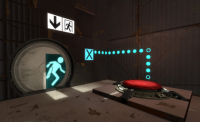Prop testchamber door: Difference between revisions
Jump to navigation
Jump to search
mNo edit summary |
mNo edit summary |
||
| Line 1: | Line 1: | ||
{{portal2 point|prop_testchamber_door}} A test chamber door entity. Essentially a [[func_door]] implemented as a model instead of as a brush. | {{portal2 point|prop_testchamber_door}} A test chamber door entity. Essentially a [[func_door]] implemented as a model instead of as a brush. | ||
==Keyvalues== | ==Keyvalues== | ||
[[File:Test_door1.png|200px|thumb|right|Testchamber Door]] | |||
{{KV|Lighting Origin|target_destination|Select an info_lighting to specify a location to sample lighting from for all gibs spawned by this shooter, instead of their own origins.}} | {{KV|Lighting Origin|target_destination|Select an info_lighting to specify a location to sample lighting from for all gibs spawned by this shooter, instead of their own origins.}} | ||
{{KV|Area Portal Window Name|target_destination|The name of an area portal window that is controlled by the door.}} | {{KV|Area Portal Window Name|target_destination|The name of an area portal window that is controlled by the door.}} | ||
Revision as of 09:29, 3 November 2011
Template:Portal2 point A test chamber door entity. Essentially a func_door implemented as a model instead of as a brush.
Keyvalues
- Lighting Origin ([todo internal name (i)]) <targetname>
- Select an info_lighting to specify a location to sample lighting from for all gibs spawned by this shooter, instead of their own origins.
- Area Portal Window Name ([todo internal name (i)]) <targetname>
- The name of an area portal window that is controlled by the door.
- Fade Area Portal? ([todo internal name (i)]) <boolean>
- If the area portal should use the specified fade distances to fade out.
- Fade Start Distance ([todo internal name (i)]) <float>
- The distance at which the area portal starts fading out.
- Fade End Distance ([todo internal name (i)]) <float>
- The distance at which the area portal turns completely opaque.
- Name (targetname) <string>
- The name that other entities refer to this entity by, via Inputs/Outputs or other keyvalues (e.g.
parentnameortarget).
Also displayed in Hammer's 2D views and Entity Report. - See also: Generic Keyvalues, Inputs and Outputs available to all entities
Parentname:
- Parent (parentname) <targetname>
- Specifies a movement parent. An entity will maintain its initial offset from its parent. An attachment point can be added to the end of the name, separated by a comma.
- Pitch Yaw Roll (Y Z X) (angles) <QAngle>
- This entity's orientation in the world. Pitch is rotation around the Y axis, yaw is the rotation around the Z axis, roll is the rotation around the X axis.
Inputs
- Open
- Open the door and cause the portal to activate.
- Close
- Close the door and cause the portal to deactivate.
- Lock
- Locking a door will prevent the Open or Close inputs from doing anything.
- Unlock
- If locked, unocking a door will allow the Open or Close inputs to function.
Parentname:
- SetParent <string>
- Move with this entity. See Entity Hierarchy (parenting).
- SetParentAttachment <string>
- Change this entity to attach to a specific attachment point on its parent. The entity will teleport so that the position of its root bone matches that of the attachment. Entities must be parented before being sent this input.
- SetParentAttachmentMaintainOffset <string>
- As above, but without teleporting. The entity retains its position relative to the attachment at the time of the input being received.
- ClearParent
- Removes this entity from the the movement hierarchy, leaving it free to move independently.
Outputs
- OnOpen
- Called when the door has started its open animation.
- OnClose
- Called when the door has started its close animation.
- OnFullyOpen
- Called when the door has finished its open animation.
- OnFullyClosed
- Called when the door has finished its close animation.
